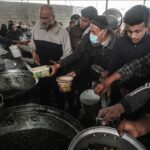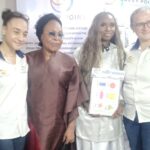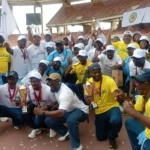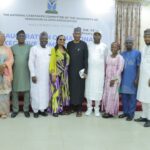By Aderogba George
Stakeholders in gender and feminist issues have called for the implementation of gender-inclusive policies that will address the plight of all women in the country.
The call is contained in a communique issued at the end of the stakeholders’ high-level meeting, tagged “WhatNaijaWomenWant campaign”, in Abuja on Saturday.
The News Agency of Nigeria (NAN) reports that the high-level capacity women meeting was hosted by Gatefield, an advocacy, public policy, and media firm, supported by Heinrich Böll Stiftung Foundation, an NGO.
NAN also reports that the communique was signed by Mrs Joy Una, Special initiatives Lead at Gatefield.
The meeting had in attendance representatives of the executive and legislative arms of government, the federal civil service, and allies from civil society, as well as the private sector.
The stakeholders recognised the crucial role women play in the nation’s development, while having a constructive dialogue, highlighting the need for policies that would address women’s unique needs and empower them to thrive.
Meanwhile, Una disclosed that Nigerian women constitute nearly half of the country’s population, and they remain under-represented in policymaking.
According to her, this lack of representation has resulted in policies that fail to adequately address the distinct challenges faced by women in Nigeria.
She said that 98 per cent of women lack access to finance and economic opportunities.
“The World Health Organization ranks Nigeria as the fourth worst country for maternal well-being. It said that 60 per cent of the 20 million out-of-school children are girls, and one in three Nigerian women has experienced gender-based violence.
“The #WhatNaijaWomenWantcampaign, is a collaborative effort between Gatefield, Dorothy Njemanze Foundation and various civil society organizations to mobilize over 3,000 Nigerian women to advocate for five key demands.
“These demands are policy and political interventions that will benefit Nigerian women, addressing key areas such as increased economic empowerment, an end to maternal mortality, increased political representation, elimination of gender-based violence, and protection of women conflict settings.
“By bringing together diverse stakeholders and presenting a comprehensive set of demands, the #WhatNaijaWomenWant campaign has laid the groundwork for concrete action.
“Gatefield also provided valuable resources to support policy makers in their efforts to create gender-inclusive policies, including a toolkit to guide policymakers in developing gender sensitive policies that address the specific needs of women.
“There is a book of demand capturing the demand for policy, a more standard equitable society,” Una said.
She disclosed that the #WhatNaijaWomenWant campaign has paced gender-inclusive policy which is at the forefront of national discourse, adding that Gatefield remains committed to working alongside government and other civil society, private sector to ensure that Nigerian women are at the center of policy making.
Princess Onuoha-Okigwe, Chairman, House of Representatives Committee on TETFUND, stated that TETFUND data shows that women are highly under-represented in decision-making in Nigeria.
Represented by Mrs Chidimma Ibezim, her personal assistant, Onuoha-Okigwe stated that Women’s political participation will bring tangible gains to the country.
She said that male and female legislators must work together to achieve the country’s development goals.
Onuoha-Okigwe also appealed for a special mentorship programme for women where others will learn from other women leaders, adding that there are no tools for efficient development without the inclusion of women.
Dr Ovuoraye John, the Permanent Secretary, Federal Ministry of Health, stated that the Ministry has a family health department which has divisions dedicated to reproductive health and family planning.
The Permanent Secretary, who is also the Director/Head, Gender Adolescent, School Health and Elderly (GASHE) division of the ministry, said that the division deals with issues of gender- based violence and menstrual health.
“There is a ripple effect when a young girl is abused. It affects the whole family. So, we urge CSOs and government agencies to work together because there is so much work to be done.
“Women’s representation in the senate has reduced but this should not discourage us from working towards what Nigerian women want,” she said.
Mrs Ngozi Okorie, Deputy Director of Research, National Human Rights Commission, commended Gatefield for hosting the event, stating that women in policy making is a very strong issue of concern.
She said that Women’s political participation is beyond political aspiration, adding that it is an international instrument recognised by the Universal Declaration of Human Rights (UDHR), in Article 21 and in International Convention on Civil and Political Rights (ICCPR) in Article 25.
Okorie said that the Convention on The Elimination of All Forms of Discrimination Against Women (CEDAW) in Article 7, also guarantees and affirms the rights of women in political activity.
“So why the gap when we have so many policies addressing this? Gender-based
Violence (GBV) is a human rights violation that negatively impacts and impedes the progress of the country in achieving the Sustainable Development Goals (1,2,3,4,5 and 16).
Habibah Abdullahi, Representative of National Commission for Refugees, Migrants, and Internally Displaced Persons, said that in a country where the plight of women was not recognised, such a country will not progress. (NAN)
Edited by Vincent Obi












